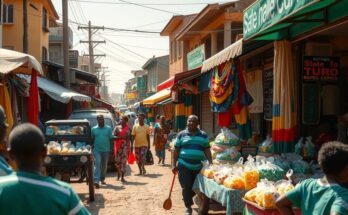South African President Cyril Ramaphosa has rejected claims of white persecution in his country as a false narrative, countering assertions made by Elon Musk and Donald Trump. The discourse revolves around accusations of anti-white sentiments in the nation, particularly linked to political events and potential violence against the Afrikaner community. The South African government emphasizes that violent crimes affect all races amidst broader national issues of crime.
South African President Cyril Ramaphosa recently refuted claims regarding the persecution of white individuals in the country, labelling such assertions a “completely false narrative.” This statement emerges in response to allegations propagated by U.S. President Donald Trump, Elon Musk, and certain white minority factions within South Africa.
Elon Musk, who was born in South Africa, has frequently accused the country’s Black-led government of anti-white sentiments. He reiterated these accusations in a recent social media post, asserting that some political figures are “actively promoting white genocide” within South Africa.
In his weekly address, President Ramaphosa urged citizens not to allow external events to sow division among them. He emphasized that South Africa is not a place where individuals of a particular race or culture are targeted for persecution. Ramaphosa’s remarks were a response to claims that the government is intentionally mistreating Afrikaners, the country’s white minority, through violent farm attacks and controversial land seizure laws.
These allegations have been pivotal to an executive order issued by President Trump, which aims to cut funding for South Africa while offering potential refugee status to Afrikaners in the United States. Historically, Afrikaners are descendants of European settlers who were central to the apartheid regime.
Musk highlighted a rally where members of the Economic Freedom Fighters, a radical opposition party, sang a song containing the phrase “Kill the Boer, the farmer.” This term refers to Afrikaners and has sparked controversy due to its association with anti-apartheid sentiments and violence against farmers. After a judicial ruling deemed the song protected under freedom of speech, it remains a contentious issue in South Africa’s political landscape.
Despite Trump’s executive order, the South African government strives to combat misinformation concerning violence against white farmers. While acknowledging occasional violent attacks on farm residents, officials argue that there is a lack of evidence indicating systemic targeting of white individuals in the country’s broader context of high crime rates that impact all racial groups.
An Afrikaner representative indicated discrepancies in reported homicide statistics, suggesting that police have significantly underestimated farm-related murders. The official data reports a staggering total of 6,953 overall homicides in South Africa for a specific period, offering a stark view of violence across all communities and not limited to race-related offenses.
The claims of white persecution in South Africa, as expressed by figures such as Elon Musk and Donald Trump, have been dismissed by President Cyril Ramaphosa as unsubstantiated. The government maintains that while violent crimes do occur, they are not racially motivated against any group specifically. The ongoing discourse surrounding this issue highlights the complexities of historical and contemporary racial dynamics in South Africa.
Original Source: apnews.com




